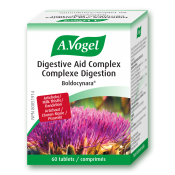Digestive problems
While people of all ages may encounter these unpleasant symptoms and disorders, nearly 40% of older adults over 50 years-old experience age related digestive problems each year…
Whether your digestive discomforts are the result of a chronic issue, or the result of something temporary (who doesn’t enjoy an extra piece of cake or two!), as time passes, the speed and efficiency with which the body digests food may start to slow down.
What changed?
Some of the reasons why we encounter difficulties with digestion as we age are:
- Our digestive system changes: Food travels through our bodies as a result of muscle contractions in our digestive system. These contractions are what push food through our digestive tract to our colon. As we age, the muscles that do the hard work of facilitating these contractions weaken, meaning that the digestion and absorption of food happens more slowly. Additionally, the cardiac sphincter, the muscle that controls the flow of food from the oesophagus to the stomach, may become weakened, resulting in heartburn. These weakened muscles also means that more water is absorbed from food waste, leading to constipation.
- Inactivity: According to the CDC (Center for Disease Control and Prevention), 28% of adults who are over the age of 50 are physically inactive. In general, inactivity in older adults increases the risk of physical and mental health problems. For the digestive system, a lack of movement and exercise can result in slower contractions, resulting in diarrhea, constipation, and irritable bowel syndrome.
- Medication: Many medications taken by older adults have the unintended side effect of causing digestive problems. For example, if you take narcotics for pain after surgery, medications aimed at countering high blood pressure, or nonsteroidal anti-inflammatory drugs (NSAIDs) for arthritis, there is a good chance that you’ll experience some form of constipation or even ulcers. In fact, narcotics can directly impact the speed and efficiency of the gut in breaking down foods resulting in fewer contractions.
- GERD: Although people of all ages may develop gastroesophageal reflux disease (GERD), it most frequently occurs in older adults. The build-up of stomach acids into the oesophagus causes heartburn, chest pain, and difficulty swallowing, amongst other symptoms.
How to improve your digestive health
Food and lifestyle changes
By changing what sorts of foods are in your diet, and the order that you consume them in, you are able to put yourself on track to making sure you are in sound digestive health. For example, by eating some foods that decompose in your stomach before those that take longer, you are ensuring that there is a proper pH stomach environment that makes for better and faster digestion. Here are five specific tips that may help with better digestion:
- No fruit after meals – Fruits are made up of simple sugars and take the least amount of time to break down in your digestive system. Eating fruits after a meal may ferment in your stomach on top of the meal you just enjoyed. Our suggestion: consume fruits as a snack and then wait 30 to 45 minutes before eating your meal.
- Eat protein and carbs at separate meals – It is speculated that proteins and carbohydrates neutralize each other: one requires an acidic environment to break down, and the other requires an alkaline environment. Our Suggestion: To avoid the symptoms of indigestion, wait around 2 hours after eating a complex carbohydrate before eating a protein. Wait 3 hours after eating food rich in protein before consuming a complex carbohydrate.
- Eat vegetables with protein or carbs, but avoid eating with fruits – Green, leafy vegetables can be eaten on their own, or eat together with either carbs or proteins. Fresh vegetables help digestion along by moving heavy foods through the digestive tract while adding bulk to stool. Fruits also work to break down other foods at a faster rate than vegetables, so it is better to keep these two types of foods separate. Our Suggestion: try pairing non-starchy or low-starchy vegetables with grains.
- Melon as a stand-alone snack – Melons are not only delicious, but they have one of the highest sugar concentrations and water content of any fruit, and thus break down rapidly after they are consumed. Our Suggestion: to make the digestive process easier for your body, eat melons by themselves and wait for about 30 minutes until your next snack or meal.
- Eat whole, unprocessed foods – To increase the amount of energy you have, to improve your overall health, and lose weight, it is recommended that food choices be based around whole, unprocessed foods that contain unprocessed carbohydrates, protein, and healthy fats.
Exercise
Athletes have been shown to have more diverse gut flora (that is, the make up of healthy bacteria that lives in our bodies) compared to the average person. What this means is that exercise, in part, helps to create a diverse environment in which food is broken down and digested. Additionally, exercise improves one’s metabolism, reduces inflammation and improves the ability of the gastrointestinal tract to protect and keep itself strong.
Herbal remedies
A group of well-known bitter medicinal herbs have been used for decades to relieve digestive problems. They include artichoke, dandelion and boldo, the three ingredients in Boldocynara. Boldocynara is a phytotherapeutic tablet and tincture that is clinically proven to reduce the frequency of digestive disorders by 78% and reduce the impact of their symptoms on everyday life by 81%. Boldocynara works by facilitating the digestion of fats, and by stimulating the secretion of bile. In this way, Boldocynara helps to cleanse and protect the liver, tackling the problem of indigestion at its root cause, rather than merely aiming for a temporary, symptomatic fix. Don’t let digestive problems get you down! Live life boldly!
References
http://www.aahf.info/sec_exercise/section/digestive.htm
https://www.cdc.gov/physicalactivity/inactivity-among-adults-50plus/adults-need-more-physical-activity-factsheet.pdf
http://www.webmd.com/digestive-disorders/features/digestive-health-aging#1
https://www.ncbi.nlm.nih.gov/pmc/articles/PMC2074872/
http://www.arthritis.org/living-with-arthritis/treatments/medication/drug-types/nsaids/nsaids-stomach-upset.php
http://www.mayoclinic.org/diseases-conditions/gerd/basics/definition/con-20025201
http://www.heart.org/HEARTORG/HealthyLiving/HealthyEating/Vegetarian-Diets_UCM_306032_Article.jsp#.VlIlf9-rR3l
http://universityhealthnews.com/daily/digestive-health/the-benefits-of-exercise-for-digestive-health/





